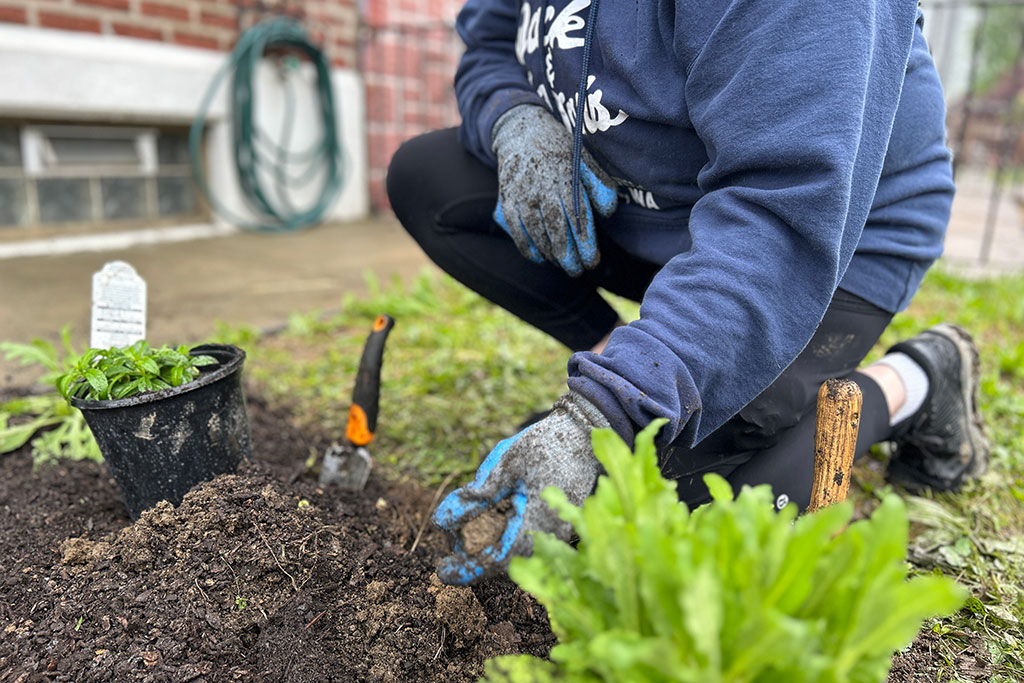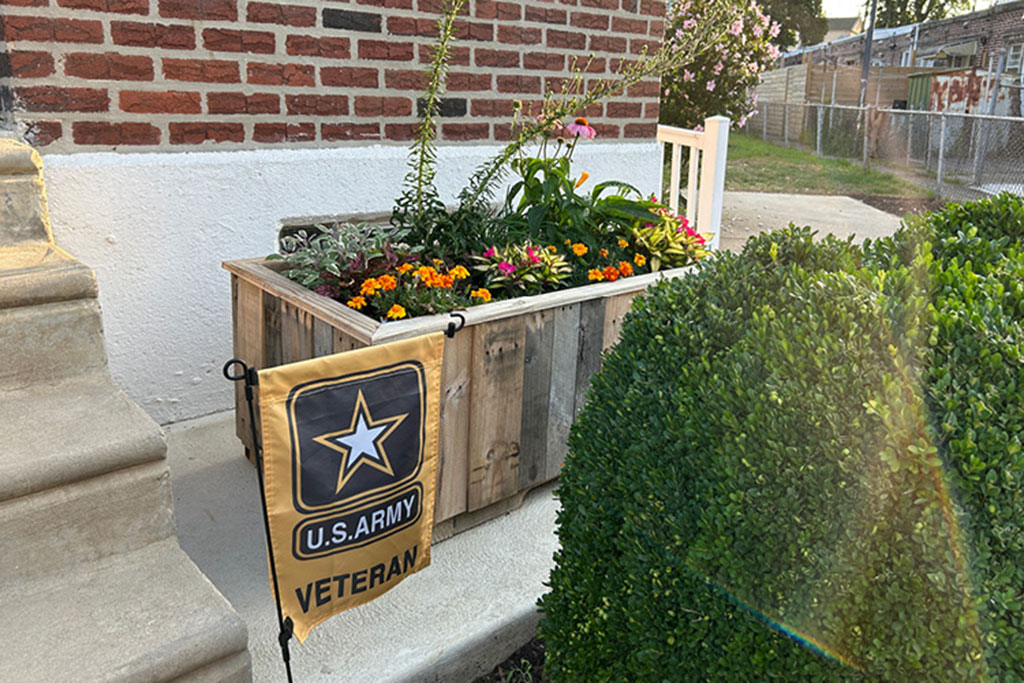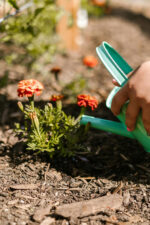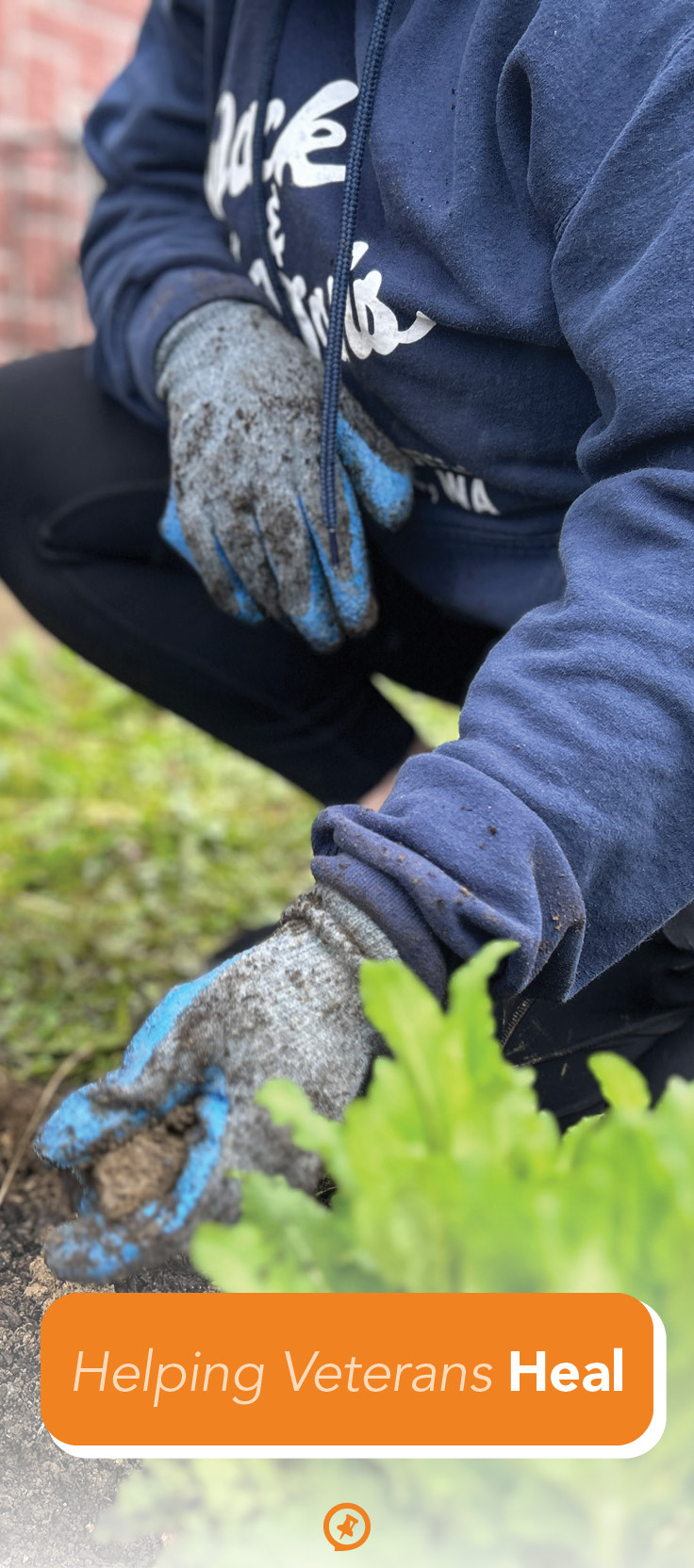Helping Veterans Heal
Interview with: Collie Turner, Chris Kaneaster, John Pilat, Salome Hall, and Michele Keyes
Photography Courtesy of: Heroic Gardens
Heroic Gardens founder Collie Turner and veteran volunteers discuss the impact of her nonprofit, which improves veterans’ yards and lives through horticulture.
Collie Turner, founder
I was raised in service—my grandfather, a World War II army medic, inspired Heroic Gardens. But I chose a different career path, which left me dissatisfied. So I started this nonprofit as a way to remember the importance of service and acting with an open heart.
A year into it, I went to school to study horticultural therapy. It’s scientifically proven that you are more relaxed and less depressed and anxious when you’re working with plants, which is why our mission is to connect veterans and their families with the healing power of nature. We transform their properties by building gardens, offer online nature-based classes, and host forest bathing meditation for communities. At the end of the day, this is horticultural therapy for both the recipient and the giver (military veteran or not). The sky’s the limit for who and how we can help.

Chris Kaneaster, air force veteran
After returning from Afghanistan, I stopped doing everything—talking to anybody, going to therapy—for almost nine months. When I found Heroic Gardens years later, my life was still rotten; I didn’t care about anything and was beating myself up over my military service.
Volunteering with Heroic Gardens brought me out of my shell and proved I wasn’t broken. Mentally, it has really helped with my PTSD, calming me down and making me believe in myself again. It feels great to go out there, contribute to other people’s lives, and make their spaces beautiful; I call it “bringing order to chaos.” I also discovered that I have a green thumb! Gardening has become an everyday passion, and I’ve learned so many new skills through the program. When you walk past a garden you created, knowing the difference it’s making to the veteran and their community, you feel such a sense of accomplishment.
John Pilat, navy veteran and Heroic Gardens board member
In the military, you work as a team but are detached in your role, so you get comfortable with isolating yourself from nature, other individuals, and society in general. That isn’t healthy. I tried various veteran-support activities over the years, but they didn’t improve my well-being. Heroic Gardens, on the other hand, did because it’s all about camaraderie: there’s always a sense of pride when you work with others to give back to the veteran community.
The program has renewed the direction in my life— I had always felt most alive outdoors, but for a while after my military service, I just stayed in. Now I spend all my free time outside again, and inside my home my plants provide clean air and a soothing aroma. This organization is certainly unique in its approach: connecting the healing power of nature with both veterans and volunteers. It’s easy to give somebody a pill for their issues, but digging in soil and breathing in fresh air is extremely and naturally therapeutic.

Salome Hall, navy veteran
Being from Brooklyn, I didn’t grow up around nature; I didn’t even know I had tree and grass allergies until boot camp. I always said that I had a black thumb because I was killing plants at an alarming rate. [Laughs]
I also experience chronic pain, guilt, and PTSD, so it’s difficult for me to move and be around others. For a long time, I was used to having a very insulated life. Thanks to working with Heroic Gardens, though, I now want to test my limits. I’m proud to say that I’ve made it to my crafting class every week, and my neighbors and I were inspired to start a community garden. A proverb I try to live by is “Society grows great when old men plant trees whose shade they know they’ll never sit in.” That’s exactly what this program does: leaves a legacy on this planet that will outlive all of us.
Michele Keyes, navy veteran and Heroic Gardens advisory board member
I had a rough time in the military. I was assaulted on my second day in the service, and I’ve carried that and other issues with me even after retiring. As a result, I’m now a mental health advocate. Like some of the others, I didn’t have a green thumb, so at my first event I just dug a hole for a tree. I fell in love with the work the minute my hands hit that nurturing soil.
When you volunteer with Heroic Gardens, it makes a real difference to both you and the recipients, and anybody, regardless of their ability or disability, can help. For example, being indoors often makes us veterans think about the things we’ve done wrong, but being out in nature allows us to let them go. And here’s an example that speaks volumes about the impact a garden makes. One day, we prepared raised beds for a World War II veteran, who watched from his door as we worked, smiling widely and giving everybody a thumbs up. That’s why I’m a part of this amazing project. The life-changing opportunities are endless for everyone involved.
For more info, visit heroicgardens.org

















